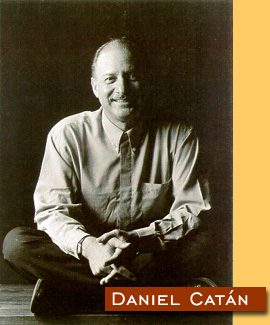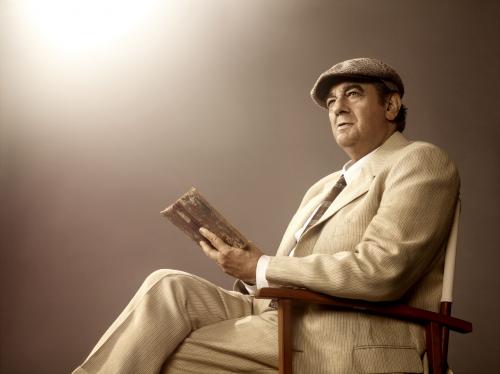Sentimentality, Pathos and Puccini: What’s So Wrong With That?

By Carol Jean Delmar
Opera Theater Ink
Daniel Catán’s “Il Postino” recently had its European premiere at the Theater an der Wien in Vienna, but Los Angeles critics gave it a far warmer reception than the Europeans did. Of course, Catán resides in Los Angeles, and Plácido Domingo, for whom the opera was written, is general director of Los Angeles Opera.
In an article from Deutsche Presse-Agentur on the website monstersandcritics.com, an entertainment reporter for the Austria Press Agency (Austria Presse Agentur) wrote that “Il Postino” was “untouched by any musical development of the past decades” and had a “sticky-sweet soundscape.”
In the same article, a critic for the Kurier wrote: “We endured a weak libretto which turned [Pablo] Neruda’s poetry into kitsch, and we saw prettily illustrated platitudes.”
Die Presse wrote that the story was “smothered in operatic sugar-icing.”
And critic Frieder Reininghaus, a German print and broadcast journalist for German radio, newspapers and journals, wrote that the music is essentially a mix of Giacomo Puccini with a pinch of Lehár. “In the era of copying and digitizing, it certainly represents no particular technical or even artistic achievement to mix old scores to a new one. . . . It’s like a honey pot has been dusted with powdered sugar. . . . The whole company [has] . . . put into effect: a production for the local museum,” he wrote.
But Jörn Florian Fuchs sees it differently. He wrote:
“For ears that are in new music . . . maybe the opera of the Mexican Daniel Catán [is] an imposition. Can we, should we write today actually a music theater that avoids extreme dissonance, instead, to Puccini, tango and castanets-bliss sound? The reviewer says: You may very well – if such it can.”
If I understand the translation correctly, I agree.
Audiences flock to hear the operas of Puccini, Verdi, Mozart, Bizet, Rossini and other composers who were skilled enough to write melodic scores. After World War II, atonal music became the norm. Nowadays, I believe that composers lack the talent to create melodies that pull the heartstrings, so modern opera has been turned into dissonant sound with bizarre sets. Technology has taken center stage with egotistical stage directors who receive all the ovations.
When I think of opera, I think of Mozart, Verdi and Puccini. I love the sentimentality in “La Traviata” and “La Bohème,” and judging from the popularity of these operas, other operagoers do as well. Yet even Los Angeles Times critic Mark Swed wrote of “Il Postino”: “The ending, unfortunately, is sappy.”
Well, I love “sappy.” I live for “sappy.” If Mirella Freni and Luciano Pavarotti can make me cry at the end of a Karajan DVD of “La Bohème,” so be it. If hearing Jussi Björling sing “Je crois entendre encore” from “Les pêcheurs de perles” can bring tears to my eyes, that is the joy of opera for me.
A few years ago, LA Opera did a production of “La Traviata” with Renée Fleming and Rolando Villazón which is recorded on DVD. Although the production did not receive all positive reviews, I loved it precisely because Fleming was able to show Violetta’s vulnerability. And nobody does it better than Angela Gheorghiu. She reminds me of Anna Pavlova – a delicate dying swan — when she succumbs to her fate in the 1994 Covent Garden production of “Traviata” conducted by Sir Georg Solti (on DVD). Such expressivity in body and voice cannot be equaled.
Singers who sing with soul are my artists of choice, and there are very few to mention. Listen to Vladimir Chernov sing “Forse in quel cor sensibile” from Donizetti’s “Roberto Devereux” on YouTube. Listen to Neil Shicoff as Eléazar when he sings “Rachel, quand du Seigneur” in “La Juive.”
The great artists are expressive. They bring out the sentimentality in all of us. Bravissimo!
There is something vitally wrong with this era and society if melodic music, beauty, pathos and sentimentality are shunned. The great composers and opera singers of the past were able to capture the essence of opera. If someone can do that in this current day and age, then that person is a rare jewel and should be coveted.
* * *
The opera “Il Postino” is based on the award-winning film “Il Postino” and the 1985 novel “Ardiente Paciencia” by Antonio Skármeta. It is the story of a shy postman who finds love in a tiny Italian fishing village by gaining wisdom and knowledge from his customer, the Chilean poet Pablo Neruda, who is in political exile there. Domingo sings Neruda through December at the Theater an der Wien. The production travels to Le Théâtre du Châtelet in Paris this June.

Plácido Domingo as Pablo Neruda, Photo by Art Streiber
Sentimentality, Pathos and Puccini: What’s So Wrong With That?
By Carol Jean Delmar
Opera Theater Ink
Daniel Catán’s “Il Postino” recently had its European premiere at the Theater an der Wien in Vienna, but Los Angeles critics gave it a far warmer reception than the Europeans did. Of course, Catán resides in Los Angeles, and Plácido Domingo, for whom the opera was written, is general director of Los Angeles Opera.
In an article from Deutsche Presse-Agentur on the website monstersandcritics.com, an entertainment reporter for the Austria Press Agency (Austria Presse Agentur) wrote that “Il Postino” was “untouched by any musical development of the past decades” and had a “sticky-sweet soundscape.”
In the same article, a critic for the Kurier wrote: “We endured a weak libretto which turned [Pablo] Neruda’s poetry into kitsch, and we saw prettily illustrated platitudes.”
Die Presse wrote that the story was “smothered in operatic sugar-icing.”
And critic Frieder Reininghaus, a German print and broadcast journalist for German radio, newspapers and journals, wrote that the music is essentially a mix of Giacomo Puccini with a pinch of Lehár. “In the era of copying and digitizing, it certainly represents no particular technical or even artistic achievement to mix old scores to a new one. . . . It’s like a honey pot has been dusted with powdered sugar. . . . The whole company [has] . . . put into effect: a production for the local museum,” he wrote.
But Jörn Florian Fuchs sees it differently. He wrote:
“For ears that are in new music . . . maybe the opera of the Mexican Daniel Catán [is] an imposition. Can we, should we write today actually a music theater that avoids extreme dissonance, instead, to Puccini, tango and castanets-bliss sound? The reviewer says: You may very well – if such it can.”
If I understand the translation correctly, I agree.
Audiences flock to hear the operas of Puccini, Verdi, Mozart, Bizet, Rossini and other composers who were skilled enough to write melodic scores. After World War II, atonal music became the norm. Nowadays, I believe that composers lack the talent to create melodies that pull the heartstrings, so modern opera has been turned into dissonant sound with bizarre sets. Technology has taken center stage with egotistical stage directors who receive all the ovations.
When I think of opera, I think of Mozart, Verdi and Puccini. I love the sentimentality in “La Traviata” and “La Bohème,” and judging from the popularity of these operas, other operagoers do as well. Yet even Los Angeles Times critic Mark Swed wrote of “Il Postino”: “The ending, unfortunately, is sappy.”
Well, I love “sappy.” I live for “sappy.” If Mirella Freni and Luciano Pavarotti can make me cry at the end of a Karajan DVD of “La Bohème,” so be it. If hearing Jussi Björling sing “Je crois entendre encore” from “Les pêcheurs de perles” can bring tears to my eyes, that is the joy of opera for me.
A few years ago, LA Opera did a production of “La Traviata” with Renée Fleming and Rolando Villazón which is recorded on DVD. Although the production did not receive all positive reviews, I loved it precisely because Fleming was able to show Violetta’s vulnerability. And nobody does it better than Angela Gheorghiu. She reminds me of Anna Pavlova – a delicate dying swan — when she succumbs to her fate in the 1994 Covent Garden production of “Traviata” conducted by Sir Georg Solti (on DVD). Such expressivity in body and voice cannot be equaled.
Singers who sing with soul are my artists of choice, and there are very few to mention. Listen to Vladimir Chernov sing “Forse in quel cor sensibile” from Donizetti’s “Roberto Devereux” on YouTube. Listen to Neil Shicoff as Eléazar when he sings “Rachel, quand du Seigneur” in “La Juive.”
The great artists are expressive. They bring out the sentimentality in all of us. Bravissimo!
There is something vitally wrong with this era and society if melodic music, beauty, pathos and sentimentality are shunned. The great composers and opera singers of the past were able to capture the essence of opera. If someone can do that in this current day and age, then that person is a rare jewel and should be coveted.
* * *
The opera “Il Postino” is based on the award-winning film “Il Postino” and the 1985 novel “Ardiente Paciencia” by Antonio Skármeta. It is the story of a shy postman who finds love in a tiny Italian fishing village by gaining wisdom and knowledge from his customer, the Chilean poet Pablo Neruda, who is in political exile there. Domingo sings Neruda through December at the Theater an der Wien. The production travels to Le Théâtre du Châtelet in Paris this June.
Plácido Domingo as Pablo Neruda, Photo by Art Streiber
Posted in Commentary/Opinion, News, Previews